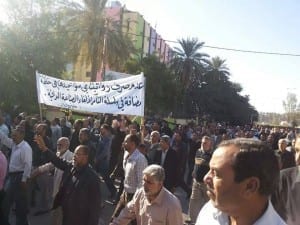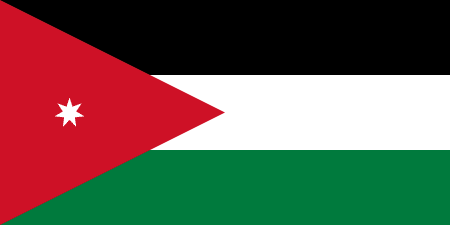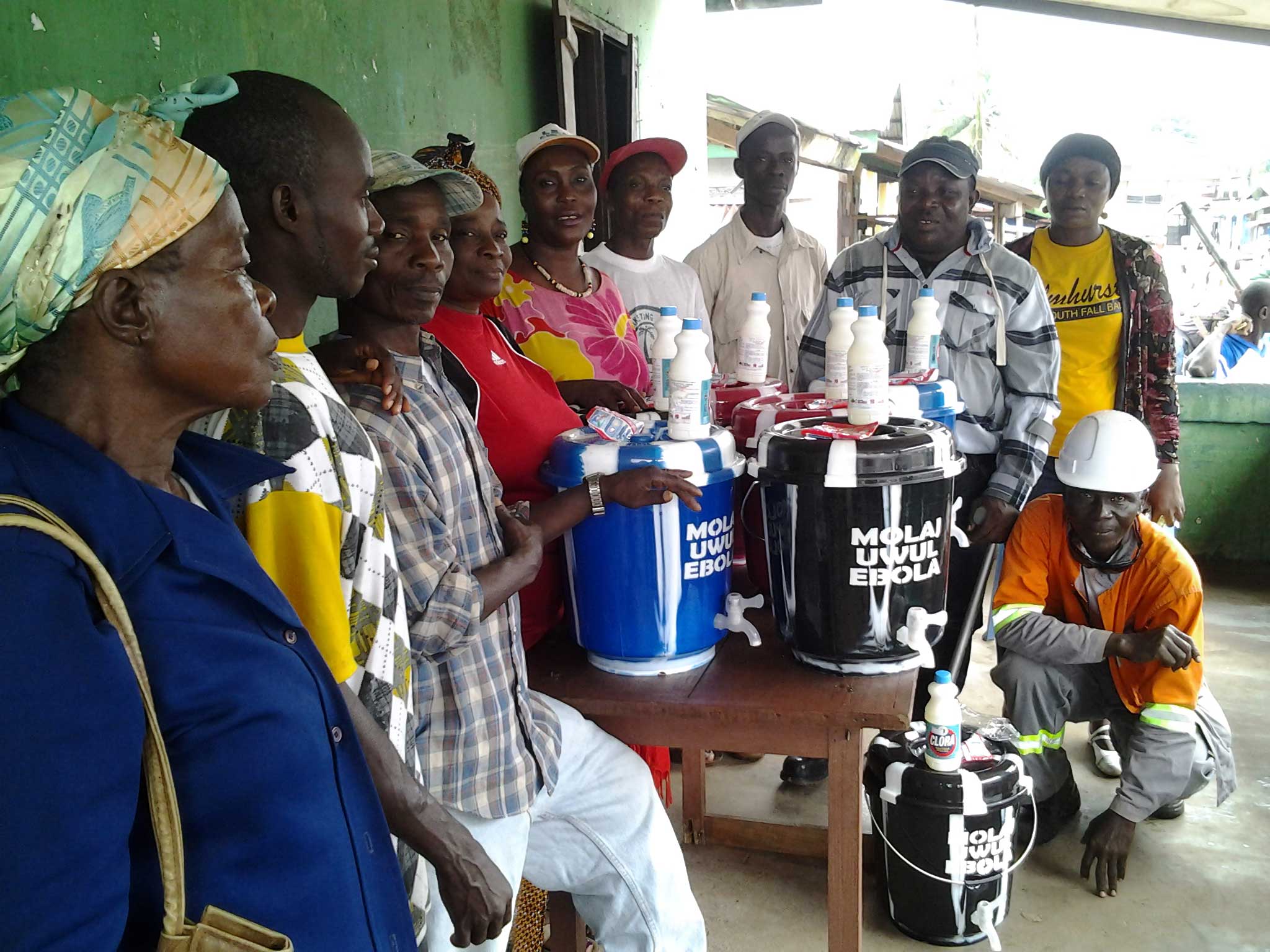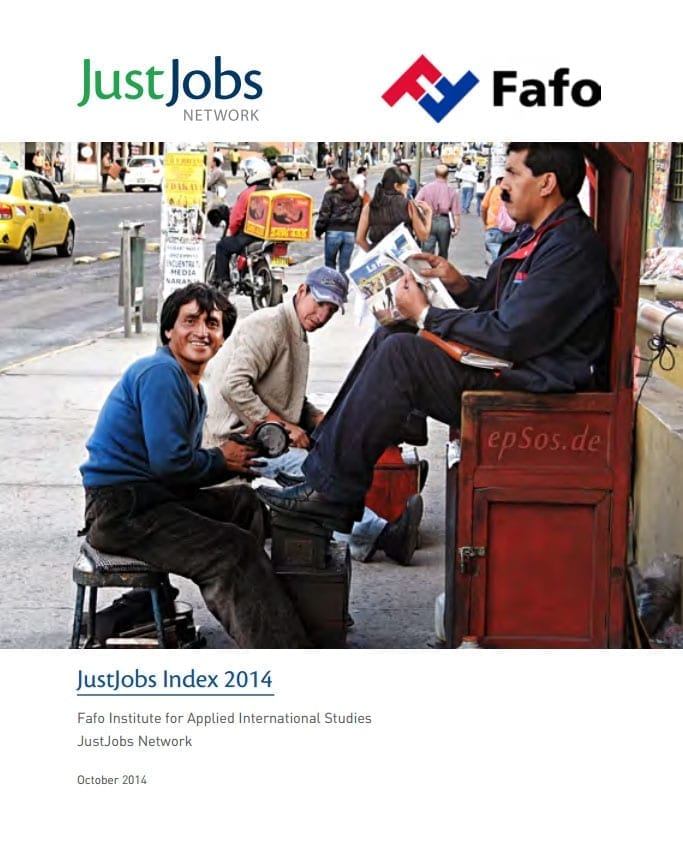Nov 17, 2014

Carrying signs protesting unpaid wages, Iraqi textile workers were among workers from several industries demanding back pay. Credit: Ali Rakeb
The Iraqi government’s offer of partial payment to workers in several industries who have not received salaries for months “is unjust” and should be amended to include all unpaid back pay, says the General Federation of Iraq Trade Unions (GFITU).
The Iraq Council of Ministers last week announced it would pay one month’s wages to workers at plants and factories affiliated with the Ministry of Industry. The companies, which are required to generate sufficient operating revenue to pay 40 percent of workers’ salaries, have repeatedly been unable to do so, and the Ministry of Industry has previously paid workers’ salaries when the companies run out of funds.
The Council of Ministers took the action after thousands of workers in Iraq’s leather, textile and vegetable oil industries protested unpaid wages this month in a series of rallies, most recently in Babylon, where hundreds of workers packed the streets leading to the factory.
Ala’a Sabri, general manager of the association of textile industries in Babylon, said, “the protestors stopped work because they have not been paid since August.”
When vegetable cooking oil company workers in Missan, who also have not been paid since August, took to the streets, they were backed by local government officials who asked the government to pay the workers and renovate Missan’s cooking oil factory, which employs 630 workers.
Clothing company employees in Najaf, who produce men’s suits, pants, jackets, gown’s (dishdasha) and military uniforms, and textile workers in Diwanyya and at the Kut textile factory, also rallied for unpaid wages.
“We are protesting today to request the officials resolve these issues,” Hayder Abdul Amir, one of the protesting employees at Kut, told Al Mada press. “We will continue until they comply with our demands.”
Earlier this month, leather workers, who have not been paid for two months, marched in a large demonstration at two leather companies in Karradha, in central Baghdad. The rally followed one in September, when leather workers protested unpaid wages from July and August.
In an action in support of workers, GFITU members rallied at the Ministry of Interior to demand the government formulate clear policies that guarantee the rights of workers in Iraq’s industrial sector by ensuring workers are paid on time. GFITU also called on the government to take steps to address ongoing factory closures that have put many workers out of a job.
GFITU presented a memo addressed to the Prime Minister Hayder Al Abadi that states: “A large percentage of Iraq’s population, represented by 350,000 employees of the Ministry of Interior and their families, are suffering from hardship and serious neglect.”
The memo listed several demands, including timely wage payment; government transparency when awarding textile and other industry contracts; and creation of a joint government council to address obstacles companies face in staying solvent.

Nov 17, 2014
Tayel Alkhamayseh, president of the Independent Union of Phosphates Workers in Jordan, returned to his job this month after worker and human rights organizations denounced his November 6 arrest and suspension, pressed for his reinstatement and decried his arrest as a move to prevent unionization at the plant.
The Jordanian Federation of Independent Trade Unions (JFITU) sent letters protesting his detention to the Ministry of Labor and company management. The National Center for Human Rights and Jordanian civil society organizations generated additional support for Alkhamayseh, who was reinstated after a meeting with management in which it was established that he had no intention of declaring a strike.
The Phosphate Workers Union is affiliated to the JFITU, which is campaigning for the Jordanian government to adopt legislation to allow full freedom of association for all workers.
The JFITU says Alkhamayseh’s arrest and suspension indicate continuing pressure to restrict the practice of independent trade unionism in Jordan. The federation notes that his reinstatement is an important demonstration of Jordanian support for independent trade unionism.
The federation formed last year, when nine unions representing more than 7,000 workers joined forces to mobilize for improved economic conditions and greater political freedom.
Alkhamayseh, an engineer, works in the White Valley phosphate mine near Karak in the south of Jordan. As president of the workers’ union in Karak, he organized a meeting that included workers from several branches of the same company. Management then suspended Alkhamayseh and accused him of inciting a strike. In response, workers organized a protest and work stoppage.
Oct 31, 2014

Workers from three union federations waged a general strike in Morocco. Credit: IndustriALL
Thousands of workers in Morocco’s three trade union federations waged a general strike Wednesday to protest the government’s refusal to discuss fundamental worker issues such as working conditions, pensions and other benefits.
manufacturing, commerce and agriculture, along with private-sector employees, took to the streets after many attempts to engage the government in collective bargaining.
The first-ever joint strike involving the Confédération Démocratique du Travail (CDT), the Union Marocain du Travail (UMT) and the Fédération Démocratique du Travail (FDT) highlighted worker frustration with the lack of dialogue. Workers also protested the government freezing salaries and benefits while raising taxes. The economic squeeze is exacerbated by the skyrocketing cost of consumer goods.
Workers also called out corporations for their selective application of Morocco’s labor code, saying many employers only abide by a few provisions and ignore key regulations such as those covering workplace health and safety and medical coverage.
The workers are demanding the government:
• Decrease taxes on wages and consumption,
• Retract the law that criminalizes union activity,
• Provide citizens with adequate public services,
• Guarantee secure and stable employment and cease hiring workers for precarious subcontracted or temporary jobs,
• End ongoing freedom of association violations, which include dismissing union leaders and firing large numbers of workers, and
• Address the concerns of retired workers struggling to survive on pensions.
Read the full list of demands in French and Arabic.

Oct 23, 2014
Union members across Liberia have taken the lead in Ebola education and prevention among workers and their families, holding awareness trainings for thousands of workers and supplying them with hand-washing buckets and sanitation cleansers donated in part through the Solidarity Center West Africa Ebola Fund.
At the Firestone Natural Rubber Plantation in Margibi County, where more than 11,000 full-time and precarious workers labor, and where 75,000 people live in 125 Firestone camps and in nearby communities, the Firestone Agricultural Workers Union (FAWUL) leaders and shop-stewards have so far reached 1,337 people in eight camps with protective equipment and information. FAWUL is a longtime Solidarity Center ally.
Working with the Movement for Labor Rights & Justice (MOLAJ), a nongovernmental organization, FAWUL has distributed 191 chlorine-filled hand-washing buckets. FAWUL members living in the area are closely monitoring use of the buckets, are teaching community members how to mix the water and chlorine, and encouraging them to replenish the chlorine when it runs out. The buckets are placed where people frequently gather, such as at community water pumps, and distributed to households with more than eight occupants.
Among workers at ArcelorMittal Liberia (AML), the United Workers’ Union of Liberia (UWUL) and UWUL Local 4, together with MOLAJ, reached 750 people through labor’s Ebola awareness and preventive measures campaign, providing 50 hand-washing buckets in communities in the Buchanan area, where a majority of AML workers live. UWUL, also a Solidarity Center ally, reached 21 disabled workers and 35 sight-impaired workers with awareness and prevention training, providing hand-washing buckets and $100 from the local union to replenish the chlorine.
Elsewhere, the Dockworkers Union (DOWUL) is reaching out to workers in Monrovia’s port; the General Agricultural and Allied Workers’ Union of Liberia (GAAWUL) has held education trainings for nearly 1,000 workers and their families living in camps at the Sime Darby Rubber and Oil Palm Plantations; and UWUL also is engaging workers at the Putu Iron Ore Mining company.
Liberia accounts for more than half of all the official Ebola deaths, nearly 2,500, and some reports indicate that figure is much higher. Women in Liberia—because of their roles as caregivers and their work in precarious informal economy jobs and as health care workers—are overwhelmingly affected: Up to 75 percent of people killed by Ebola have been women. Children orphaned by the disease often are left alone to survive in the street.

Oct 20, 2014
A new data-driven online index launched by JustJobs Network, a nonpartisan global policy and research institute, highlights the need for sustainable employment and offers policymakers and other decision-makers worldwide a tool to help generate more and better jobs worldwide.
Created in partnership with Fafo, an independent and multidisciplinary research foundation, the JustJobs Index offers the first-ever index to measure both quantity and quality of jobs. The site includes two indexes with country-by-country data trends between 2000 and 2013. The Global JustJobs Index ranks 148 countries on quantity and quality of employment in 10 areas, such as unemployment and gender equality. The Enhanced JustJobs Index includes 41 countries where more extensive data is available, and offers 17 indicators. The site also provides longitudinal country comparisons, maps and downloadable reports.
The JustJobs Index is anchored in the International Labor Organization (ILO) decent work agenda and Article 7 of the International Covenant on Economic, Social and Cultural Rights recognizing the right of everyone to just and favorable working conditions. An accompanying report details the methodology underlying the data.
More than 200 million workers around the world are jobless, nearly 40 percent of them young workers, and many more—approximately half the global workforce—labor in the informal sector, where they lack basic protections. And even formal sector workers increasingly find their wages stagnant and their benefits stripped away.
JustJobs says the index should “provide a strong empirical basis for policy dialogue and formulations” as more policymakers and leaders around the globe recognize that high inequality is a sign that a country’s labor market is not producing enough good jobs and that work “is fundamental to the well-being of economies.”





